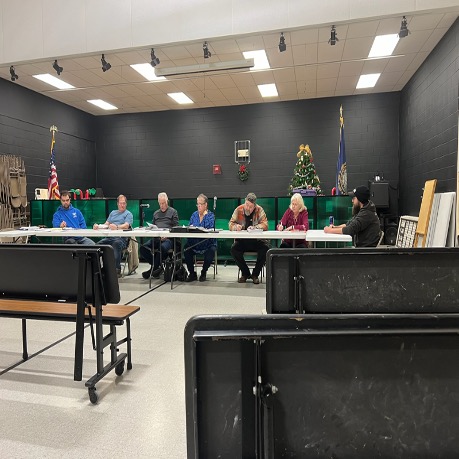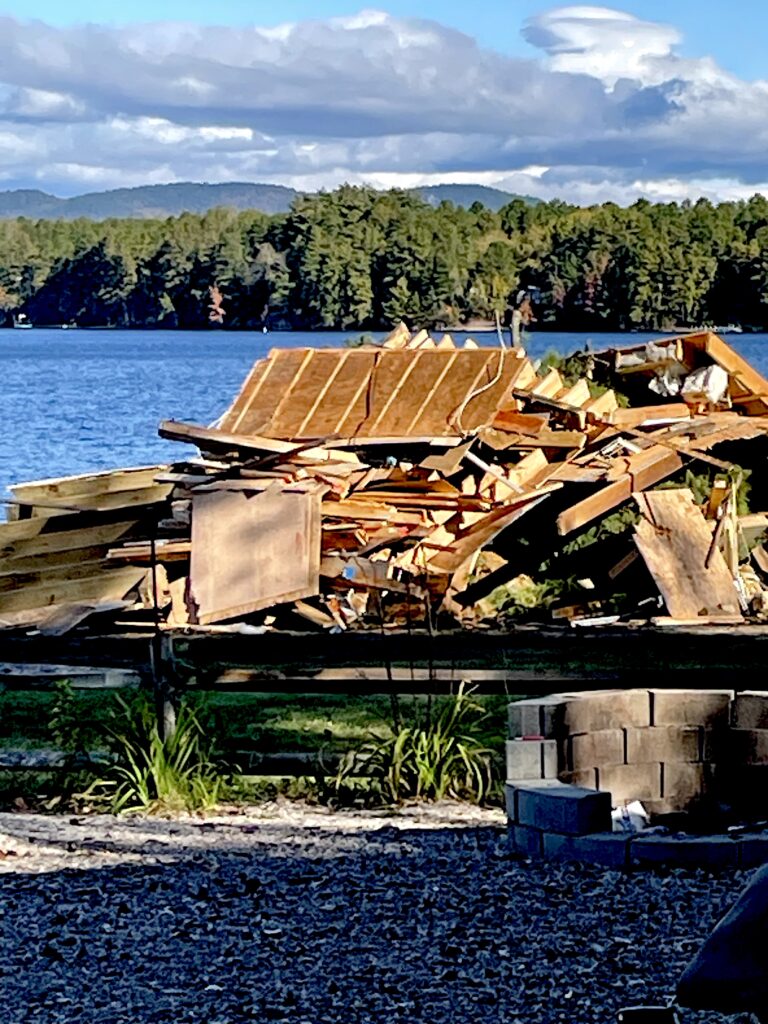Once again the year’s news was dominated by the Effingham gas station, starting with a difference of opinion about whether the zoning ordinance required Conway developer Meena LLC to obtain a special use permit governing the handling of petroleum products.
North Point, the Planning Board’s independent advisor, said it did, the developer said it didn’t, and the Planning Board sided with the developer. Abutters appealed, and in January a judge ruled that the variance authorizing a prohibited use did not turn the prohibited use into a permitted special use.
The decision was ridiculed as legal hair-splitting, but the upshot was that the developer did not have to comply with the environmental safeguards that a special use permit would have required.
A Board Chair’s Opinion
April saw Planning Board Chair George Bull ask the Select Board to revoke a letter of decision written by Zoning Enforcement Officer Rebecca Boyden, putting him in the middle of a legal wrangle involving the developer whose site plan application his board was reviewing.
Boyden later changed one of the dates in her letter, but did not change her conclusion that Meena’s convenience store was closed for more than two years. What that means for the store’s zoning status will be decided by the ZBA in January.
Planning Board Special Counsel Chris Boldt took note of Bull’s involvement in the Boyden matter, saying that evaluating the Zoning Officer’s decisions is not a Planning Board function.
“Findings of Fact”
A 98-item “Findings of Fact” document was the basis of the Planning Board’s conditional approval of the development on July 11, a vote that took place before the abutters, the public or the nine regional towns with standing in the matter were allowed to review it and comment.

Effingham Planning Board members editing the “Findings of Fact” that would be the basis of approving the Meena LLC site plan later that night. Contributed Photo
The document’s release a few days after the vote caused bewilderment over a startling claim in Item 12 that triggered a weeks-long independent analysis of the entire document, revealing errors, omissions and misleading statements.
Among the omissions were the most basic facts of all: The site is a former gravel pit with highly transmissive soils, is adjacent to numerous wells, is directly above the Ossipee Aquifer, and is in a zone where gas stations are prohibited as a threat to drinking water.
Also missing: the Development of Regional Impact designation, the petition signed by 700 people, the video by Dr. Robert Newton viewed by more than 1,000 people, and the letter from the N.H. Department of Transportation prohibiting state property from being used by Meena to meet its stormwater management obligations.
Included as a fact, but actually false, was a purported state waiver allowing the underground gas storage tanks to be closer to the site’s public water supply than state regulations allow.
The Planning Board has never acknowledged the independent report.
A Teen’s Environmental Education
Our piece about 15-year-old high school student Stella Lunt, was our most-read story of the year. Stella lives close enough to the proposed gas station to be affected by it, but not close enough for her family to have abutter status.

Fifteen-year old Stella Lunt is a familiar presence at the gas station hearings.
That hasn’t prevented her from attending hearings, writing letters, posting signs and observing the adults in the room.
She said she was grateful for being listened to, but disappointed in what she had seen—and not just at the hearings. Her school bus stop is in front of the Meena property, so she had a front row seat when the owner started building the gas station without required approvals.
Personal Experience
Readers also took to a story featuring Stella’s mom, Billie Lunt. As a teenager, Billie babysat for Leona Simon, whose husband died shortly after the couple and their small children were forced to move out of their Ossipee home because their well was poisoned by a state road salt dump.
Fast forward 30 years and Billie, married with children of her own, reconnected with the older woman while canvassing homes in Blueberry Estates, which abuts the Meena property. The two began attending the hearings together, with Billie’s daughter Stella in tow.
Leona said she wanted to share her first-hand experience with Effingham’s decision-makers, so she wrote to them, saying “The water quality issue is personal with me.”
“What Meena is proposing is a huge risk that, in my view, the Planning Board is not taking seriously,” her letter concluded.
After Simon passed away from pancreatic cancer this year, we told her story with her friend Billie’s help. It was our second most-read article of the year.
The Whistleblower
Whistleblowers can be motivated by a lot of things, but whatever motivation Effingham resident Marty Casey had in alleging irregularities at Ossipee Lake Camping Area doesn’t excuse the obscenities, vitriol and school yard taunts directed at him, his wife and his deceased son.

A debris pile at Ossipee Lake Camping Area, on the Leavitt Bay shoreline.
The last time we saw anything like it was 14 years ago—at another campground. A combination of issues at Westward Shores that year erupted into weeks of campers verbally abusing owner Charlie Smith, whose financial troubles were leaked to the public by a campground insider.
Lost in all the noise about Casey’s allegations was that they either panned out or proved to be worthy of investigation, as the article made clear.
Rare Plants and Scofflaws
Ossipee Lake Natural Area has rare plants and natural communities not known to exist elsewhere. For some, that’s pretty interesting, but not to a lot of boaters.
Once again, boaters and their children and dogs made themselves at home beneath the No Trespassing signs, knocking down fencing to use the woods as a toilet. Law-abiding boaters who have tried to reason with the scofflaws have faced verbal abuse and threats.
Since you don’t need to know a hairy Hudsonia from a bog birch to understand the meaning of a No Trespassing sign, the violations are willful, and they are increasing. The state wants a bigger fine for trespassing, but that could take years and require a law enforcement effort that seems unlikely.
Some Good News
Tamworth adopted a groundwater protection ordinance by a wide margin. It was the result of a multi-year public awareness effort by the town’s Planning Board and Conservation Commission.
The vote made Tamworth the 111th New Hampshire community to formally protect its drinking water. Area conservationists are now looking into what needs to be done to strengthen ordinances statewide in light of what is occurring in Effingham.
Good news for us: Brian Taylor joined our board. The Effingham native, who lives on Berry Bay, has a solid resume of accomplishments in business and as a volunteer. We had hoped to recruit him for some time, and this year it came together.
Your Turn
We get letters and comments to our stories, and we follow the lake social media sites. What we have seen this year suggests it’s time for an open-ended survey for you to speak your mind so we can create a “state of the lake” report to share with state and local officials. Look for it soon.
In the meantime, Happy New Year, and all the best for a peaceful 2024.

Thanks so much for your clearly stated and accurate reporting of this very important information for those of us who live here all the time and are very concerned for our home and environment. I am ashamed of the Effingham Planning Board not seeing the horrible impact of this illegal proposal and protecting what the citizens of this town voted on in 2011 at town meeting.